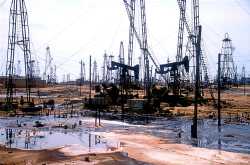UK E.R.C.: cheap oil is at an end
Warning over global oil decline

02:50 GMT, Thursday, 8 October 2009 03:50 UK, BBC News
There is a “significant risk” that global production of conventional oil could “peak” and decline by 2020, a report has warned.
The report’s authors also state that
the 10 largest oil producing fields in the world are all in decline.
The UK Energy Research Council study says there is a general consensus that the era of cheap oil is at an end. But it warns that most governments, including the UK’s, exhibit little concern about oil depletion.
Reliable gauge
As this report points out, the debate about peak oil is a polarised one.
On one side, there are those who say that global supplies have already reached their zenith, and we are unprepared for the crisis that will hit world economies in the years to come.
On the other, there are oil companies and many energy analysts who dismiss the notion that supplies are running out.
The report’s authors admit it is hard to tell who is right, as the world lacks a reliable gauge with which to measure oil depletion.
Problems are created by “inconsistent definitions”, it says, noting the “paucity of reliable data, the frequent absence of third-party auditing of that data and the corresponding uncertainty surrounding the data that is available”.
It goes on: “The difficulties are greatest where they matter most, namely the oil reserves of Opec countries.
“But they also apply at a much more basic level, such as uncertainties over the amount of oil produced by a given country in a given year.
“The resulting confusion both fuels the peak oil debate and creates substantial risk in relying on any particular set of numbers.”
Part of the difficulty in estimating the amount of oil left is that those with the reserves are often unwilling to divulge what can be commercially very sensitive information.
Countries and companies are notoriously reticent about their oil reserves.
But the report suggests the easy oil has already been found, and new reserves will become increasingly difficult and expensive to extract, and will not make up for the current major oil fields as they decline.
It says: “More than two-thirds of current crude oil production capacity may need to be replaced by 2030, simply to keep production constant.
“At best, this is likely to prove extremely challenging.”
More attention urged
This report does not contain new research, but is a review of data already available.
But the authors say the risk presented by global oil depletion deserves much more serious attention by the research and policy communities.
“Much existing research focuses upon the economic and political threats to oil supply security and fails to either assess or to effectively integrate the risks presented by physical depletion,” they argue.
“This has meant that the probability and consequences of different outcomes has not been adequately assessed.”
Despite the evidence, the report notes with some surprise that the UK government rarely mentions the issue in official publications.
By Sarah Mukherjee
Environment correspondent,






Perhaps a few have read how the oil barons sabotaged better fuels, back when Henry Ford designed the Model T. It was his expectation that ethanol, made from renewable biological materials, would be a major automobile fuel. However, gasoline emerged as the dominant transportation fuel in the early twentieth century … because of a growing supply of cheaper petroleum from oil field discoveries, and … intense lobbying by petroleum companies for the federal government to maintain steep alcohol taxes. Many bills proposing a National energy program that made use of Americas vast agricultural resources (for fuel production) were killed by smear campaigns launched by vested petroleum interests. One noteworthy claim put forth by petrol companies was that the U.S. government’s plans “robbed taxpayers to make farmers rich”.
Gasoline had many disadvantages as an automotive resource. The “new” fuel had a lower octane rating than ethanol, was much more toxic (particularly when blended with tetra-ethyl lead and other compounds to enhance octane), generally more dangerous, and contained threatening air pollutants. Petroleum was more likely to explode and burn accidentally, gum would form on storage surfaces and carbon deposits would form in combustion chambers of engines. Pipelines were needed for distribution from “area found” to “area needed”. Petroleum was much more physically and chemically diverse than ethanol, necessitating complex refining procedures to ensure the manufacture of a consistent “gasoline” product.
WHY oh WHY don’t we just grow hemp or another suitable high yield plant that will provide very high grade fuel for diesel engines. The inventor made these engines to run on peanut or other type of vegetable Oil. NOT Heavy Oil from crude.
We could have a carbon neutral product and all the revenue would stay in OUR Countries and the farmers would be able to make a decent living too. Sounds TOO Good to be true, but it is. PLUS hemp would provide pulp for paper, fibre for cloth better than denim/cotton. This is why the oil corps of Rockefeller demonised HEMP earlier this century as they knew Oil wouldn’t be valued so highly if Hemp farms across USA/Globe were producing cash crops of Hemp Seed/OILs. CORRUPT, Evil organisations.